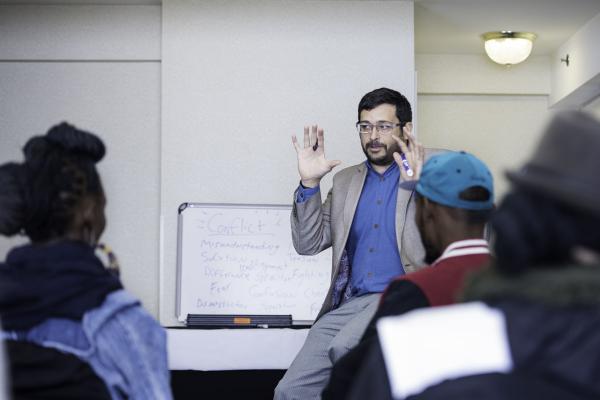Using hip-hop to resolve global conflict
Ph.D., Conflict Resolution, University of Bradford, UK 2012
M.A., Conflict Resolution (with Merit), University of Bradford, UK
 |

Hip-hop DJs, MCs, beatmakers and dancers from around the world descended on a hotel conference room in Washington, D.C., this spring to learn how to turn their high-energy musical art into tools for empowerment, entrepreneurship and conflict resolution.
The program is called Next Level, which teaches “hip-hop diplomacy” and is sponsored by the Department of State’s Bureau of Educational and Cultural Affairs and the University of North Carolina’s music department. Program organizers called on George Mason University professor Arthur Romano for the second year to conduct the workshop of participants from danger-laden conflict zones in Uganda, El Salvador, Tanzania, Thailand and Honduras.
The idea, Romano said, is to build on their creativity and leadership to change attitudes at home and amplify the voices of young people. They were selected because of their leadership skills and their desire to make a change.
“The richness of the discussion was amazing,” said Romano, who has been teaching about peace and social justice related themes with artists and musicians for some 20 years. “Everyone had experienced different forms of violence, but they shared a creative language and connection through hip-hop.”
During their session the artists were challenged to employ critical thinking about theories of conflict, inequality and conflict resolution and “how power functions, and how to shift those dynamics,” said Romano.
Among other themes, the musicians discussed ways of challenging youth stereotypes as they experience them in their own countries.
The participants are now on missions throughout the world to serve as artists-educators to conduct hip-hop academies.
“They were brilliant,” Romano said. “It was an honor to work with them.”
This material is presented as the original analysis of analysts at S-CAR and is distributed without profit and for educational purposes. Attribution to the copyright holder is provided whenever available as is a link to the original source. Reproduction of copyrighted material is subject to the requirements of the copyright owner. Visit the original source of this material to determine restrictions before reproducing it. To request the alteration or removal of this material please email [email protected].
rosters
IMPORTANT LINKS
- Home
- Admissions
- Academics
- Research & Practice
- Center for Peacemaking Practice
- Center for the Study of Gender and Conflict
- Center for the Study of Narrative and Conflict Resolution
- Center for World Religions, Diplomacy, and Conflict Resolution
- Indonesia - U.S. Youth Leadership Program
- Dialogue and Difference
- Insight Conflict Resolution Program
- Parents of the Field Project
- Program on History, Memory, and Conflict
- Project on Contentious Politics
- Sudan Task Group
- Undergraduate Experiential Learning Project
- Zones of Peace Survey
- News & Events
- Student and Career Services
- Alumni
- Giving





